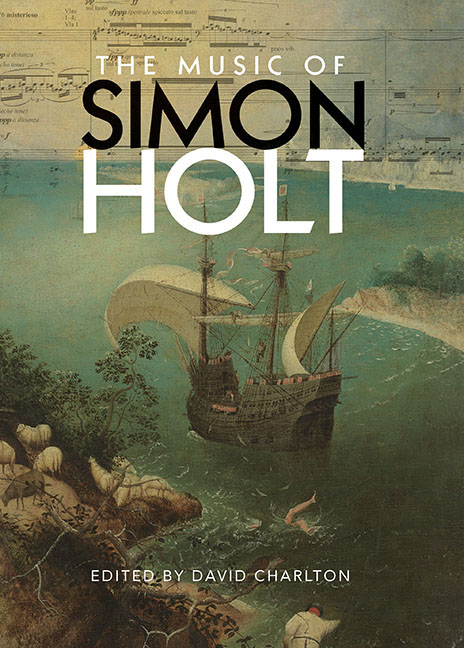Book contents
- Frontmatter
- Contents
- Figures and Tables
- Contributors
- Preface and Acknowledgements
- Abbreviations, with a note on recordings and scores
- Introduction Memories of Magical Moonlight: Simon Holt's years as a composition student
- 1 Duende y Duelos: The Andalusian spirit in the Lorca settings
- 2 An Interplay of Passion and Spirit: The Nightingale's to Blame
- 3 Images in Sound: Movement, harmony and colour in the early music
- 4 Myth and Narrative in 3 for Icarus
- 5 Sound, Sense and Syntax: The Emily Dickinson settings
- 6 Piano Music
- 7 Redefining the Cello's Voice: Musical agency in feet of clay
- 8 Performance and Reflections: Holt's music for oboe and cor anglais
- 9 Shaking the Bars: The Yellow Wallpaper
- 10 Listening to the River's Roar: Stance, texture and space in the concertos
- 11 Orchestral Works in Performance
- 12 Oblique Themes and Still Centres: A conversation between
- 13 Sketching and Idea-Gathering
- 14 Art, Conceptualism and Politics in Holt's music
- Appendix A Overview and Catalogue of Pieces
- Appendix B Texts by Simon Holt for Raju Raghuvanshi is a ghost and The Legend of Melusine
- Bibliography
- Index of pieces by Simon Holt
- General index
Preface and Acknowledgements
Published online by Cambridge University Press: 01 September 2018
- Frontmatter
- Contents
- Figures and Tables
- Contributors
- Preface and Acknowledgements
- Abbreviations, with a note on recordings and scores
- Introduction Memories of Magical Moonlight: Simon Holt's years as a composition student
- 1 Duende y Duelos: The Andalusian spirit in the Lorca settings
- 2 An Interplay of Passion and Spirit: The Nightingale's to Blame
- 3 Images in Sound: Movement, harmony and colour in the early music
- 4 Myth and Narrative in 3 for Icarus
- 5 Sound, Sense and Syntax: The Emily Dickinson settings
- 6 Piano Music
- 7 Redefining the Cello's Voice: Musical agency in feet of clay
- 8 Performance and Reflections: Holt's music for oboe and cor anglais
- 9 Shaking the Bars: The Yellow Wallpaper
- 10 Listening to the River's Roar: Stance, texture and space in the concertos
- 11 Orchestral Works in Performance
- 12 Oblique Themes and Still Centres: A conversation between
- 13 Sketching and Idea-Gathering
- 14 Art, Conceptualism and Politics in Holt's music
- Appendix A Overview and Catalogue of Pieces
- Appendix B Texts by Simon Holt for Raju Raghuvanshi is a ghost and The Legend of Melusine
- Bibliography
- Index of pieces by Simon Holt
- General index
Summary
BORN IN 1958, Simon Holt belongs to a group of British composers whose origins came after the war years and austerity. A preceding ‘1940s’ group would include Gavin Bryars, Brian Ferneyhough, Roger Smalley, John Tavener, Michael Nyman, David and Colin Matthews, Michael Finnissy and Denis Smalley. The ‘1950s’ group begins with James Dillon (b. 1950) and ends with Mark-Anthony Turnage and George Benjamin (both b. 1960). Near its beginning is a cluster consisting of Judith Bingham, Oliver Knussen, Robert Saxton and Judith Weir.
By any standards this musical field is large, its achievements still growing. If it is too soon to write a history of this generation's music, we (the listeners) can always hope to be better informed about individual composers’ work, with writings as well as recordings. Simon Holt's presence in contemporary music has been continuous since the early days of Kites and Syrensong. Suffice it to say that of 79 pieces listed, our catalogue documents about fifty pieces commissioned at home and abroad, including seven for the BBC Proms plus six other BBC commissions such as the violin concerto, witness to a snow miracle. In 2017 Surcos receives its premiere in Berlin under Sir Simon Rattle, then another hearing in the new Hamburg concert hall, the Elbphilharmonie.
Yet Holt's work has too often been missing from the record. The following pages survey the main outlines of his creative life, even as it continues. They cover all principal topics, although not all his pieces, by any means, have found mention. The reader will, however, gain a rounded impression of the composer's output and thought to date, not only from the viewpoint of the listener but also that of the performer and conductor. This is surely appropriate for a composer who demands unusual commitment from his interpreters, but for the purpose of making music which speaks with extraordinary power.
Our four chapters about vocal music and opera also respect the literary dimension. In six chapters about instrumental music our authors have fulfilled a prediction made in 2003: ‘In the new millenium it seems likely that the critical interpretation of musical compositions will need ever more sensitive ways of exploring interactions between formal and hermeneutic strategies’.
- Type
- Chapter
- Information
- The Music of Simon Holt , pp. xiii - xvPublisher: Boydell & BrewerPrint publication year: 2017



